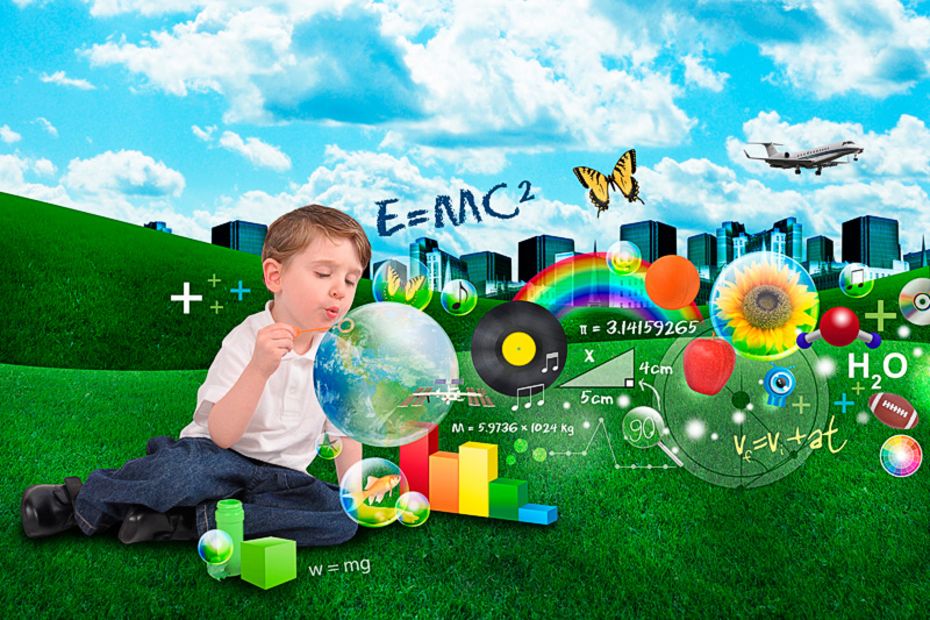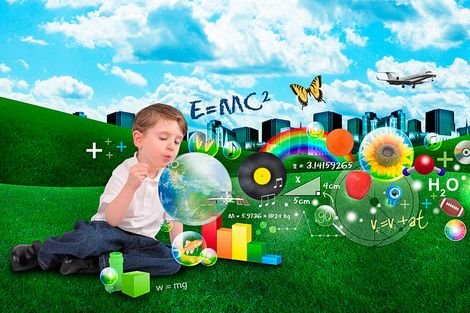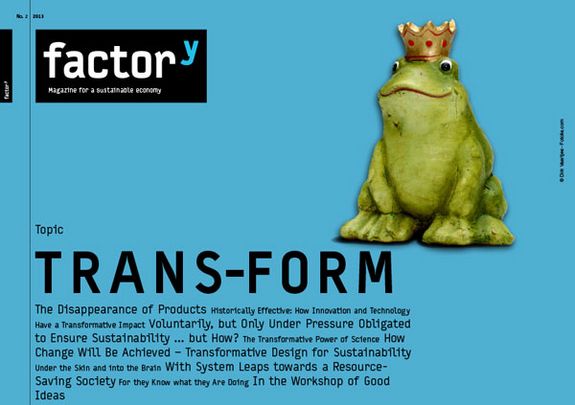Trans-form

Science often only observes processes of social change. Alternatively, it provides technological knowledge but does not get further involved. This is not enough to implement a transformation towards sustainable development. Science needs to become ‘transformative science’. It has to intervene actively in the process of social change. This influences scientific approaches and methods.
The point of view of Uwe Schneidewind
(Translated from the German by Kerstin Haep, Chantal Gruber, Olympia Klassen, Christoph Ulbert, Eva Maria Flucke and Maciej Maj)
To support processes of social change unerringly, three forms of knowledge are needed.
First, we need system knowledge. This is knowledge about the interaction of technology, economy, politics and society. An example is in the context of our energy supply system. Without such system knowledge, a turnaround in energy policy is impossible. System knowledge is the classical product of science. Nevertheless, it is rarely successful in building a bridge between knowledge in technological and social science. Indeed, there are many insights into technological options of the turnaround in energy policy, but there is less information about necessary participation procedures or innovative financing models. And research that combines both aspects is extremely rare. At this point it already becomes clear that transformative science must become more interdisciplinary than it is today.
Second: in addition, we need target knowledge. Social transformation can only be realised if we have a conception of an aim. Such an objective would be 100 per cent renewable energy. But how decentralised should the renewable energy generation become in the future? Which combination of renewable energy is required? How much energy should be consumed in total and how much energy needs to be conserved by 2050? Without a clear objective it is not possible to create a process of change. Generally, science leaves these questions to politics. However, science can contribute a lot to target knowledge. It can develop consistent scenarios and provide ethical justifications of targets – all of these are scientific contributions. Thus, we need a close cooperation between science and individuals from politics and society to generate target knowledge. Interdisciplinary then becomes transdisciplinary – this means a connection of scientific knowledge with the (target) knowledge of the people concerned. Only this turns science into a catalyst for transformation.
Third: finally, we need transformation knowledge, which is knowledge about how to provoke change.
Such knowledge must not be scientifically abstract but ‘socially robust’. This means that the players on site are given accurate information about their actions. How do I organize the energy transition in my municipality as a policy maker? How do I support new ideas for mobility in my city? These questions need answers that are tailored to the situation on site.
From scientific labs to social living labs
Such transformation knowledge cannot be acquired by simply developing models in an ivory tower. Instead, just like with complex technical inventions, labs are required in which it is possible to test, work on and gradually improve new ideas. Such laboratories for processes of social change can be individual municipalities, for example, or districts as well as individual companies or sectors. In all of these ‘living labs’, processes of change can be tested, analysed and constantly optimised with assistance from scientists.
For this type of transformative science, we need scientists with enhanced capabilities that go beyond the methodical excellence of their own discipline. Training and experience are necessary to further the development of such capabilities. We need research and development programs for a corresponding science. All this is still in its infancy and has to be considerably cultivated so that science as well can become a driving force in a transformation towards sustainability.
Prof. Dr Uwe Schneidewind is an economist and the president of the Wuppertal Institute for Climate, Environment and Energy.
More articles to the topic-range of transformation, transition and change you will not only find online than in our magazine Trans-form. The PDF-magazine contains additional facts and citations, is nicely illustrated and quite good readable on tablets and screens.
Sources/literature:
Schneidewind, Uwe and Mandy Singer-Brodowski. Transformative Wissenschaft. Klimawandel im deutschen Wissenschafts- und Hochschulsystem (Transformative science. Climate change in the German science and university system). Marburg: Metropolis, 2013. Print. German.
Schneidewind, Uwe. Plädoyer für eine Bürgeruniversität (A plea for a citizens’ initiative). duz MAGAZIN Aug. 2013: 30-31. Print. German.
Wissenschaftlicher Beirat für Globale Umweltveränderungen (WBGU). Welt im Wandel – Gesellschaftsvertrag für eine große Transformation (World in transition - a social contract for sustainability). Berlin: WBGU, 2011.
Beiträge online
TRANS-FORM

- The Disappearance of Products
- Historically effective: How innovation and technology transform
- Freiwillig nur unter Zwang. Nachhaltig verpflichtet, aber wodurch?
- Mit Systemsprüngen zu ressourcenleichten Lebensstilen
- The Transformative Power of Science
Themen
- The Domino Effect: the Mobility Transition as an Engine for the ‘Great Transformation’
- Cities Use the Space
- Decarbonization by 2030
- The fear of biting the hand that feeds you
- Where investing is a pleasure
- Why divestment is going to change the world
- A Robin Hood tax for climate protection
- May the Force Be with Us
- Modern Strategies
- The prerogative of interpreting the future now lies with the companies involved in climate protection”
- From Negotiating to Trading Equitably
- Can a donkey be tragic?
- Rethink rather than rebound: a sufficiency revolution must precede the efficiency revolution
- On Rebound, Prebound and Performance Gaps
- So Let Us Seize Power Then!
- With Common Property Against Political Failure
- So Let Us Seize Power Then!
- The Comforting Beauty of Failure
- “It Is Not Impossible at All.“
- Resource-light shopping
- Men Have Not Stopped Giving the Advantage to Women – So Far
- Toothpaste for Princesses and Soup for Pirates
- It is about equality
- A nice day
- Initiative instead of frustration
- The right ingredients
- Resilient for Life
- Not only, but also
- Appreciation – more please!
- Worth more than money
- Learning to value the value of goods
- Worth and Values
- The Transformative Power of Science
- Historically effective: How innovation and technology transform
- The Disappearance of Products
- Growing Older 101
- Columbus’ Egg
- It Works! In Theory at Least ...
- What If...?
- Analysing Separately – Thinking and Acting Together!
- Let’s Break Away from Determined Breaking Points
- More Gold in Waste than in Mines
- The art of separation
- Should you really DIY?
- The Aesthetics of Do-It-Yourself
- Standing on One’s Own Feet
- From the handaxe to desktop fabrication
- Using Shares to Survive the Crisis
- When Citizens participate
- Possess to Participate
- The Right Growth at the Right Time
- Gunter Pauli and Blue Economy
- When Sustainability Grows
- How we treat Growth
- Illusions about Growth


